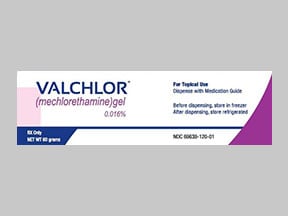
Valchlor Coupons & Savings Card – Discount Prices from $6278.13
My prescription
Edit
60GM of 0.016%, Valchlor (1 Tube)
Select pharmacy

Albertsons
$6278.13
COUPON PRICE
Walmart
$6288.10
COUPON PRICE
Walgreens
$6299.09
COUPON PRICEValchlor savings card
Show this card to your pharmacist
Albertsons
$6278.13
BIN
ID
PCN
GRP
019876
LH550E2ADF
CHIPPO
LHX
Powered by
Related alkylating drugs prescriptions
More prescriptions for skin cancer
Related alkylating drugs prescriptions
More prescriptions for skin cancer
Price history for Valchlor
1 Tube, 60GM of 0.016%
Average retail price for Valchlor
Average SaveHealth price for Valchlor
Our price history data is based on aggregated prescription data collected from participating pharmacies in America. Our prescription data updates daily to reflect the latest price changes. If you notice a missing data point, it means there wasn't sufficient data available to generate a monetary value for that date.
*Retail prices are based on pharmacy claims data, and may not be accurate when we don't have enough claims.
Valchlor dosage forms
Dosage Quantity Price from Per unit 60GM of 0.016% 1 Tube $6278.13 $6278.13 60GM of 0.016% 2 Tubes $12548.76 $6274.38 60GM of 0.016% 3 Tubes $18819.39 $6273.13
| Dosage | Quantity | Price from | Per unit |
|---|---|---|---|
| 60GM of 0.016% | 1 Tube | $6278.13 | $6278.13 |
| 60GM of 0.016% | 2 Tubes | $12548.76 | $6274.38 |
| 60GM of 0.016% | 3 Tubes | $18819.39 | $6273.13 |
What is VALCHLOR used for?
VALCHLOR is used for the treatment of stage IA and IB mycosis fungoides-type cutaneous T-cell lymphoma in patients who have received prior skin-directed therapy.
Is VALCHLOR a specialty drug?
Yes, VALCHLOR is considered a specialty drug. It is used for the treatment of certain types of skin lymphoma and requires special handling and administration.
How much does VALCHLOR cost?
The cost of VALCHLOR can vary depending on factors such as the pharmacy, location, and insurance coverage. It is recommended to check with local pharmacies or consult with a healthcare provider or insurance company for the most accurate and up-to-date pricing information.
What is the VALCHLOR patient assistance program?
The VALCHLOR patient assistance program is designed to help eligible patients access VALCHLOR (mechlorethamine) gel, a medication used for certain skin conditions. This program may provide the medication at a reduced cost or even for free, depending on the patient's financial situation and insurance coverage. Patients typically need to meet specific criteria to qualify, and the program may require an application process. It is advisable for patients to contact the program directly or consult with their healthcare provider for more detailed information and assistance with the application process.
What are the side effects of VALCHLOR?
Valchlor (mechlorethamine) gel may cause several side effects. Common side effects include skin reactions at the application site, such as redness, itching, swelling, blistering, or ulceration. Less common side effects can include skin infections or allergic reactions. It is important for patients to follow their healthcare provider's instructions and report any severe or persistent side effects.
